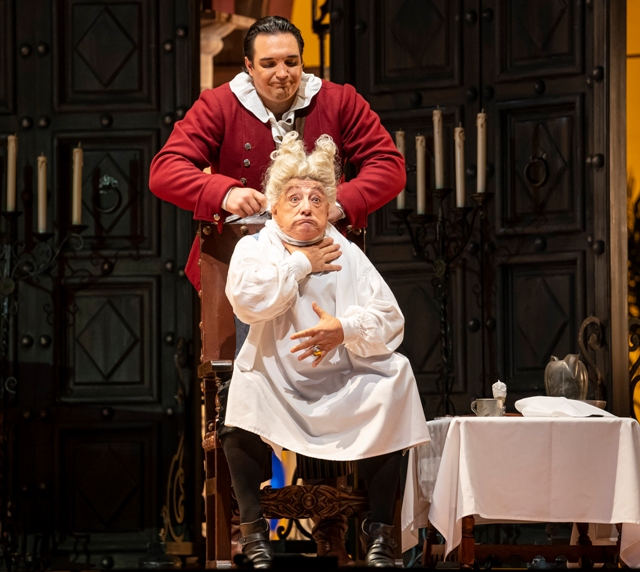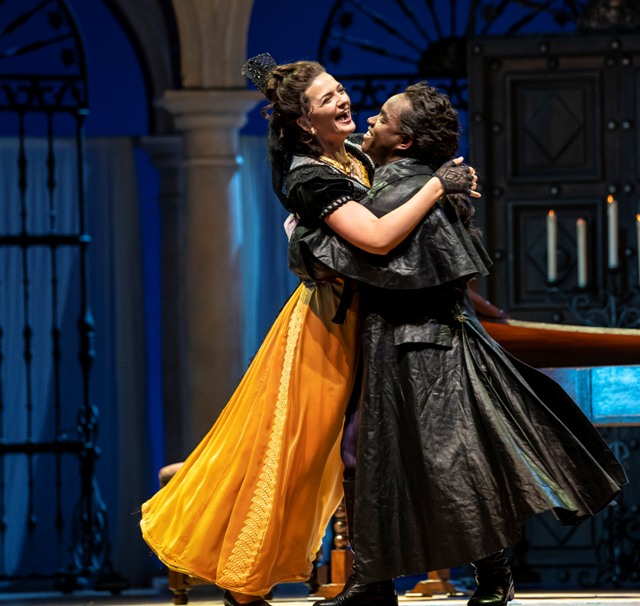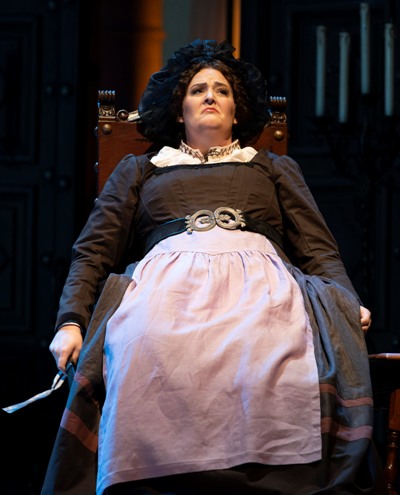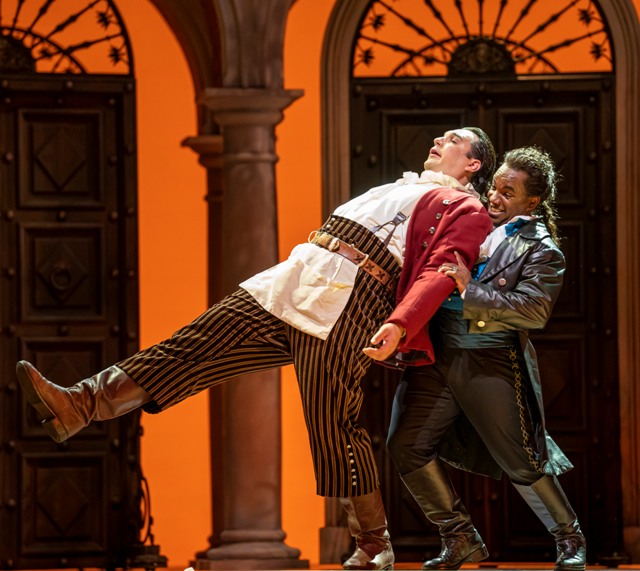‘Barber of Seville’ at Lyric Opera: Girl power prevails amid vocal fireworks, lots of laughs
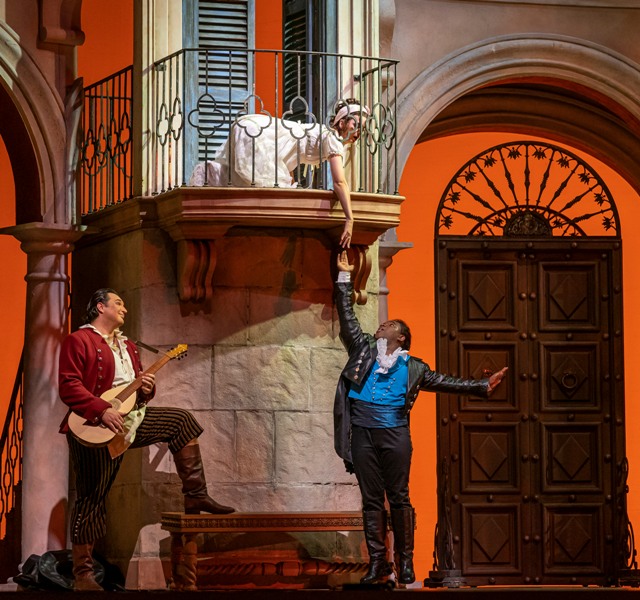
Count Almaviva (Lawrence Brownlee, right) serenades Rosina (Marianne Crebassa) while Figaro (Adam Plachetka) strums. (Photos © Todd Rosenberg for Lyric Opera of Chicago)
Review: “The Barber of Seville” by Gioachino Rossini. Presented by Lyric Opera of Chicago through Oct. 27. ★★★★
By Nancy Malitz
As I walked into the Lyric Opera House on opening night of its new season, I thought of a newspaper article I had just read, written by children. One impressive nine-year-old, insisting “it’s not right” that girls not be paid the same as boys in jobs, had the spunk to argue that “Just because we’re girls doesn’t mean we don’t work hard enough!”
Her words were on my mind as I noticed a fair number of girls in their festive best at the opening night performance Sept. 28 of Rossini’s “The Barber of Seville,” a gleeful “opera buffa” in which a truly awesome spitfire is determined to get her way.
The Broadway style production, with sun-drenched Moorish colors and roving set pieces on wheels, was originally created by Rob Ashford for the Lyric in 2014. Now it has been revived anew by Tara Faircloth. Her brilliant cast, a motley crew of comedians in all sizes, was gleefully game to explore the long and short of it.
The plot goes like this: Rosina falls in love with a mysterious suitor (Count Almaviva in disguise) who serenades her. But Rosina’s crotchety old guardian, Dr. Bartolo, is instantly suspicious. He has his own lascivious interest in this young ward, and in her sizable inheritance – maybe not in that order. Ridiculous high-jinks abound as the infatuated young lovers enlist the help of wily Figaro, a good-hearted jack-of-all-trades, who’s especially creative when there’s a big tip involved.
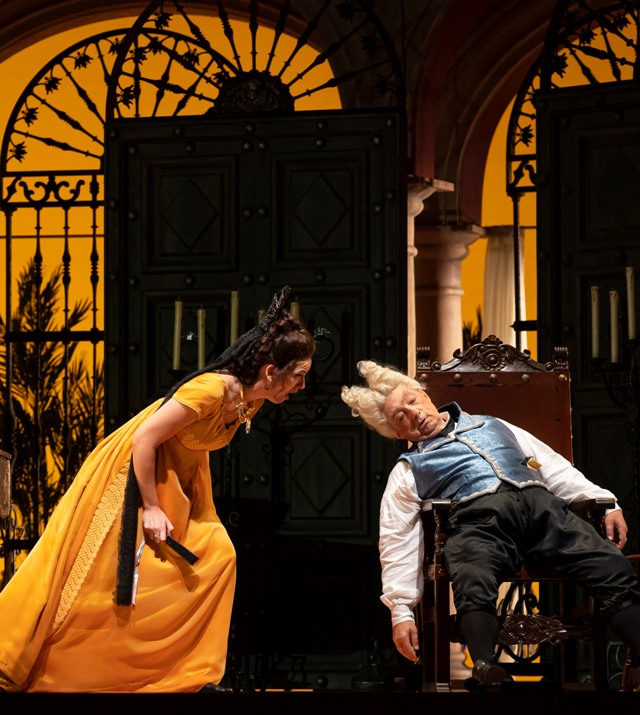
Rosina waits for guardian Dr. Bartolo (Alessandro Corbelli) to fall asleep so she can have some fun.
Figaro interferes on the lovers’ behalf in some of the most audacious, out of control scenes that Rossini ever penned. The opera is riddled with symphonic laughter, and Lyric music director and principal conductor Andrew Davis led an orchestra that sparkled from beginning to end with dizzying repetitions and crescendos.
“The Barber of Seville” is laugh-out-loud funny, even as it is peppered with the subversive spirit of the Pierre Beaumarchais 1775 French play on which it’s based. (The librettto’s by Cesare Sterbini.) Rosina and her suitor, a spunky young couple, are determined to outwit old Bartolo, but they will need ridiculous disguises and fairy-tale tactics to get the job done.
And if the happily-ever-after ending seems too good to be true, as those who know the Mozart sequel to this story, “The Marriage of Figaro” can attest, never mind. This chapter is a delight, and not only for the stunts Figaro pulls on the old guardian, whom he plays like he’s fingering a Stradivarius guitar.
Czech bass-baritone Adam Plachetka, in the title role, personified the Mr. Fixit and behind-the-scenes manipulator without whom the upper classes of Seville could not function. “They want me everywhere,” Figaro crows gleefully in his famous entrance aria, the “Largo al factotum” (Make way for the handyman), though this handyman knows to hide his braggadocio when the aspect of abject subservience suits his needs.
Impressive throughout, Plachetka was also a cool ensemble player. The scene in which Figaro distracts old Bartolo by giving him a shave is a famous set-piece of comic timing; the barber’s goal is to keep Bartolo looking the other way so that Rosina’s suitor, disguised as a timid music teacher, can canoodle with her at the piano. Plachetka’s facile precision in these interchanges kept him merrily involved in the general goings on. The barber may have seemed to miss a spot or two on Bartolo’s beard, but Figaro didn’t really miss a thing.
There’s a counterpart to this factotum – Don Basilio, Rosina’s tutor, in Dr. Bartolo’s employ. Bass Krzysztof Bączyk appeared as a towering reed of the sort who might fold himself to get through doors. In his sly set piece “La calunnia” (Calumny), Basilio suggests to Bartolo that they start a malicious rumor about Almaviva, which would grow from a wisp of a breeze into a vicious hurricane. Some ideas never die.
Marianne Crebassa’s gorgeous mezzo-soprano made for a voluptuously precocious Rosina. She flitted about the stage looking every bit the impetuous girl. But her voice in “Una voce poco fa,” as she imagined what she’d do if she didn’t get her way in love, glittered with the imperious resolve of “I am woman.” Facile and funny, she and her newfound lover were just terrific together, equally smitten.
(Meanwhile Berta, the bewildered maid, is brought to life by Ryan Center soprano Mathilda Edge in a confident cameo debut. She stoically opines about love’s madness even as she regrets it seems to be passing her by.)
Tenor Lawrence Brownlee, in the role of Rosina’s disguised lover “Lindoro” – actually Count Almaviva – is that rare artist, a robust high Rossini tenor with no seeming end to the rapid, stratospheric patter that he can toss off like a trifle. Brownlee was also a stitch in the opening act, when he organized a serenade and even tried to jump up into his adored Rosina’s too-high balcony, to the crowd’s audible delight.
As for Brownlee’s spectacular set piece at the end of the show – when the suitor reveals himself to Bartolo as the Count he really is, and forthwith orders the guardian to cease resisting (“Cessa di più resistere”) Almaviva’s quest to marry the girl – there has been some argument for decades about whether to perform, or not perform, the scene at all. It’s a huge eight-minute stretch for Almaviva near the opera’s end, really a glorious challenge musically, of which Brownlee, among just a few tenors in the world, is a master.
But viewed another way, the Count’s aria is a brutal shout-down that hints at the cruelly tyrannical attitude the Count will adapt in the next opera, “The Marriage of Figaro,” threatening his and Rosina’s happiness in just a few years time. And given baritone Alessandro Corbelli’s almost endearing characterization of Rosina’s ultimately brow-beaten old guardian, one can’t help but feel a little sorry for him, that the Count humiliates him so.
Even more reason to leave the scene in place, then, as long as there’s someone like Brownlee to sing it. What struck me this time around was how judgmental and imperious this young Count appeared to be in his anger, his presumption. Brownlee may have touched on something there, something hinting at the sequel. A latent edge of tyranny and self-righteousness.
The Count may be justified in the moment, if not entirely good. Almaviva will almost certainly become more powerful, but perhaps not more wise.
Related Link:
- Performance location, dates and times: Details at TheatreInChicago.com

